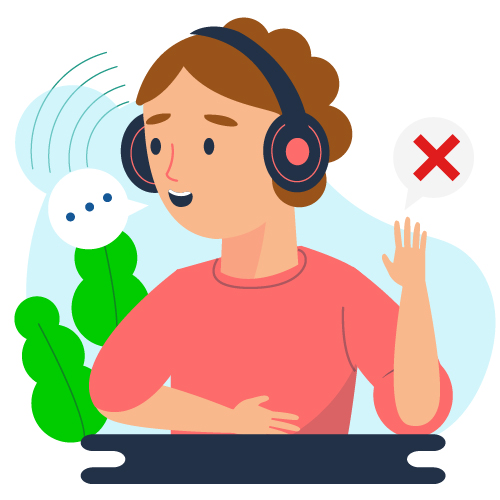Common IELTS myths to avoid
Energized to begin IELTS test preparation? Want to ace the IELTS test with a high band score?
Great!
But as you move on with your preparation, more questions may arise, such as:
How do I choose the best response to a multiple-choice question?
What if I don’t know the response to a certain query?
Will I be able to finish the test by the deadline?
What can I do to improve my band score even more?
And the list goes on.
Myths about the IELTS that prevent you from achieving a high band score
You also have to cope with the fallacies surrounding the IELTS Exam, which makes it more difficult for you to achieve good scores. You’ll become perplexed by all of these.
In order to prepare for the actual test with greater focus, look at the facts and bust the myths.
1. When compared to other English language proficiency tests, IELTS is more challenging
An IELTS test is performed to evaluate a candidate’s English language proficiency in order for them to obtain the necessary score to fulfill their need to study or settle abroad. It is graded using a 9-band scale, which hasn’t changed in 20 years.
Additionally, the IELTS test is neither passed nor failed. It gives you a Band Score based on how you performed. Therefore, it is a false assumption that you should avoid.
2. There is a chance to do better if the IELTS exam is taken in the nation of residence.
This is a widespread misconception that most IELTS candidates hold. But one must realize that the academic or general training IELTS Exam criteria is the same anywhere that the test is administered. Therefore, the outcome will totally depend on how well you perform rather than where you appeared.
Regarding the IELTS results, hopefuls hold still another myth. They contend that outcomes might differ based on the test center you select or the examiners that review your paper. This is untrue once more. None of the testing facilities are unfair. On the exam day, they are simply performing their duties.
3. Making the examiner laugh or smile throughout the IELTS Speaking Test may result in a high IELTS score.
During the test, it’s a good idea to maintain your composure and composure by smiling. By doing so, you can reduce anxiety and enhance your performance.
In the IELTS Speaking test, the examiner solely looks at your English proficiency and the way you display your abilities. Your IELTS score won’t change if you smile or laugh. You are solely evaluated depending on how well you perform.
4. Writing more words than allowed in the IELTS Writing Test will help you receive a higher score.
You must write 150 words for Task 1 and 250 words for Task 2 of the IELTS Writing Test. Writing more than the allotted word count can also lower your band score on the IELTS, just as writing fewer words will. Therefore, it is essential to finish your assignment within the allotted word count. When grading the test, proper spelling, grammar, sentence structure, and vocabulary are taken into account.
5. Speaking with a different accent from the British, American, or Australian ones reduces IELTS band score
Your accent does not need to change for the IELTS Speaking Test. Your natural accent is OK. But to ensure that the examiner can comprehend what you are saying, talk clearly and naturally.
In ordinary conversation with friends, coworkers, and family, practice using English. Learning how to pronounce certain words correctly may also be accomplished by listening to native speakers.
6. If the examiner disagrees with the viewpoints presented in the writing or speaking examination, the score may be reduced.
In the IELTS Speaking and Writing tests, there is no such thing as a right view or a wrong opinion. You receive a grade depending on:
How well you express your English language abilities
How well you can articulate and explain your concepts
7. Only one IELTS test attempt is permitted.
Once more, individuals taking the IELTS exam hold this misperception. However, the truth is that you may take the test an unlimited number of times. The IELTS test can be taken as many times as you’d like. However, each time you schedule a test, you must pay the exam price.
You will feel more at ease with your IELTS exam preparation if you eliminate these falsehoods. After that, you may concentrate on what is crucial for getting a high IELTS band score.
You may get the free IELTS practice exams as well for efficient test preparation. Take these exams and get them reviewed by professionals. You may use this to assess how well you’ll fare on the test itself.
8. IELTS is a more challenging English test than others.
IELTS is regarded as one of the top exams for the English language and has a framework that has been tried and true for many years. While there are other exams like the TOEFL and PTE, they each have their own forms and are not on a level with IELTS in terms of degree of difficulty. Regardless of how challenging the questions are, focused practice will help you get your desired score.
9. There is just one right response
We suppose this is a persistent misconception! In the IELTS, there is no definitive response to any question. Basically, the examiner determines a test-aptitude taker’s based on his or her grammar accuracy and range, pronunciation, and ability to understand the questions. For instance, two or more test-takers may choose various answers, and each one may be accurate because it implies a similar meaning to the question’s answer.
10. I won’t impress the examiner again if I pause more when I speak.
You are mistaken. Your attention should be on what you are saying, not on the ticking timer within your head.
It’s possible that the examiner isn’t keeping track of how often you pause while speaking. Most importantly, “you should not be conscious of the number of pauses that you offer when speaking”; doing so might demotivate you. Be yourself and talk clearly.
Yes, it is true that the IELTS test is difficult, but adding myths makes it impossible for the students to pass. Nevertheless, the examination will analyse you in a very constructive approach.
Remember to research the rationale behind any IELTS misconceptions before you believe them. By busting these myths, you’ll be able to focus on what really matters: learning for your IELTS test and getting the required passing score.



